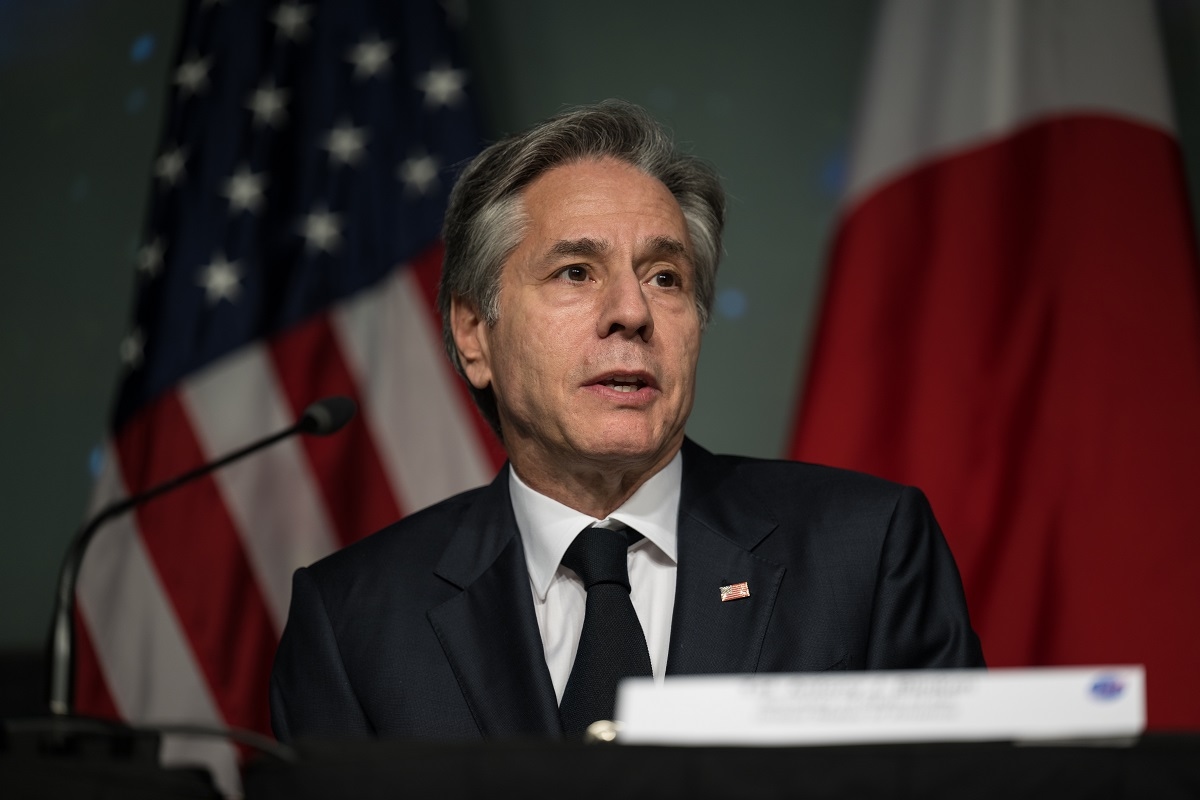Last week, US Secretary of State Antony Blinken announced the US Global Music Diplomacy Initiative, aimed at strengthening peace, democracy and the promotion of US values through music programs. At the Washington DC launch, Blinken sang and played guitar to Muddy Waters’ “Hoochie Coochie Man”.
Blinken’s (known on Spotify as Ablinken) love of music has been noticed by other world leaders. Some have given him locally made guitars during state visits, and Japan’s Foreign Minister Yoshimasa Hayashi even shared a karaoke session with Blinken on the sidelines of this year’s G7 meeting.
Australian politicians also dabble. Former prime minister Scott Morrison plays ukelele, and Midnight Oil frontman Peter Garratt was a senior Labor minister. Prime Minister Anthony Albanese has traded records with former NZ prime minister Jacinda Ardern, gone crate digging with Indigenous singer-songwriter Budjerah, finished 2022 with a speech at Woodford Folk Festival, and enjoys djing. But, unlike Blinken, these politicians’ love for music has not translated into music diplomacy.
A music diplomacy program fits well with the broader branding of the Albanese government. More importantly, it will help strengthen people-to-people and business links in the Indo-Pacific and support a struggling Australian music industry.

Music diplomacy
The US Global Music Diplomacy Initiative seeks to “elevate music as a diplomatic tool to promote peace and democracy and support the United States’ broader foreign policy goals”. To do this, it is establishing mentoring and scholarship programs, international exchanges and arts envoys (including to China) and hosting international musicians and sponsoring US bands to perform internationally.
Music diplomacy (like many forms of public diplomacy) peaked during the Cold War. America sent jazz ambassadors worldwide to “deflect attention from the spiralling civil rights abuses and present a uniquely American art form that the Russians couldn’t compete with”. The United States targeted Europe, Africa and Asia to garner public support and spread US cultural values.
Eurovision is without a doubt the most famous example of music diplomacy, seeing Europe through turbulent times and camp musical numbers since 1956.
Recently, K-pop has become the most prominent music diplomacy success story, strengthening the image of South Korea globally and facilitating a rise in US college students learning Korean. Having seen the success of K-pop, the South Korean government has deployed it in their international relations, inviting K-pop stars to perform at the first South Korea–North Korea Summit in Pyongyang in 2018 and act as UN Special Presidential Envoys.
The Australian music industry
This year, the Australian music industry has grappled with its domestic and international reputation. Conversations were sparked by US rapper Azealia Banks’ critique of the Australian music scene as “culturally stale” and “insignificant”. There is some truth to Banks’ words – Australian charts are dominated by UK and US artists. But her comments undermine Australian artists managing to cut through to global audiences. Tame Impala, Amyl and the Sniffers, and Kid Laroi have all achieved international success. However, the Australian music industry is struggling to bounce back from the pandemic and cope with the rising cost of touring, alongside competing with global artists on streaming platforms and social media.
In recognition of this, the Albanese government announced a new National Cultural Policy, which included the creation of Music Australia, a new organisation dedicated to investing in and supporting Australian music. But more is needed to strengthen Australian music globally.
Implementing Australian music diplomacy
The success of Australian music internationally is a whole-of-nation effort. As Australia’s soft power policymaker, the Department of Foreign Affairs and Trade has a role to play in ensuring Australia’s global music success.
The 2017 Foreign Policy White Paper noted that Australia needs a “stronger national brand”. To achieve this, Australia must market “our commercial, educational and cultural credentials”. Music is a key way to do this.
Australia’s version of music diplomacy is primarily done through Sounds Australia and the Australian Cultural Diplomacy Grants Program. The goal of Sounds Australia is to support Australian music globally – this includes at international music forums (such as the US South by Southwest), and by assisting Australian music exporting, global networking and Australian musicians performing overseas.
The Australian Cultural Diplomacy Grants Program has most recently supported the Sounds Australia Aussie BBQ at Summer Stage 2022. Australian artists Baker Boy, Electric Fields, G Flip, Haiku Hands, Peking Duk and You Am I all performed in Central Park, New York City. Other highlights of Australia’s music diplomacy include The Kimberly Indonesia Project, Indigenous Australian record label Gaba Musik working with Papua New Guinean company Makoda, and the China Music Now Australian music showcase.
But music diplomacy isn’t just about strengthening people-to-people connections. It’s also about business links in an industry where revenue is expected to double to US$131 billion by 2030. While the Australian music industry is struggling, post-lockdown excitement has emboldened audiences to support live music. Taylor Swift’s Australian Eras Tour is expected to inject up to $320 million into the Australian economy.
As the United States amplifies its music diplomacy, there is space for Australia to turn up the volume on its own efforts, including by extending its Australian Music Industry South American Trade Mission into the Indo-Pacific, particularly in countries such as South Korea, Japan and Indonesia.
A stronger music diplomacy program can work alongside the government’s broader Indo-Pacific strategy to strengthen people-to-people and business links. The Albanese government is uniquely positioned to capitalise on this, as music has become part of the PM’s personal branding.
So, a DJ Albo set to launch Australia’s music diplomacy program?

